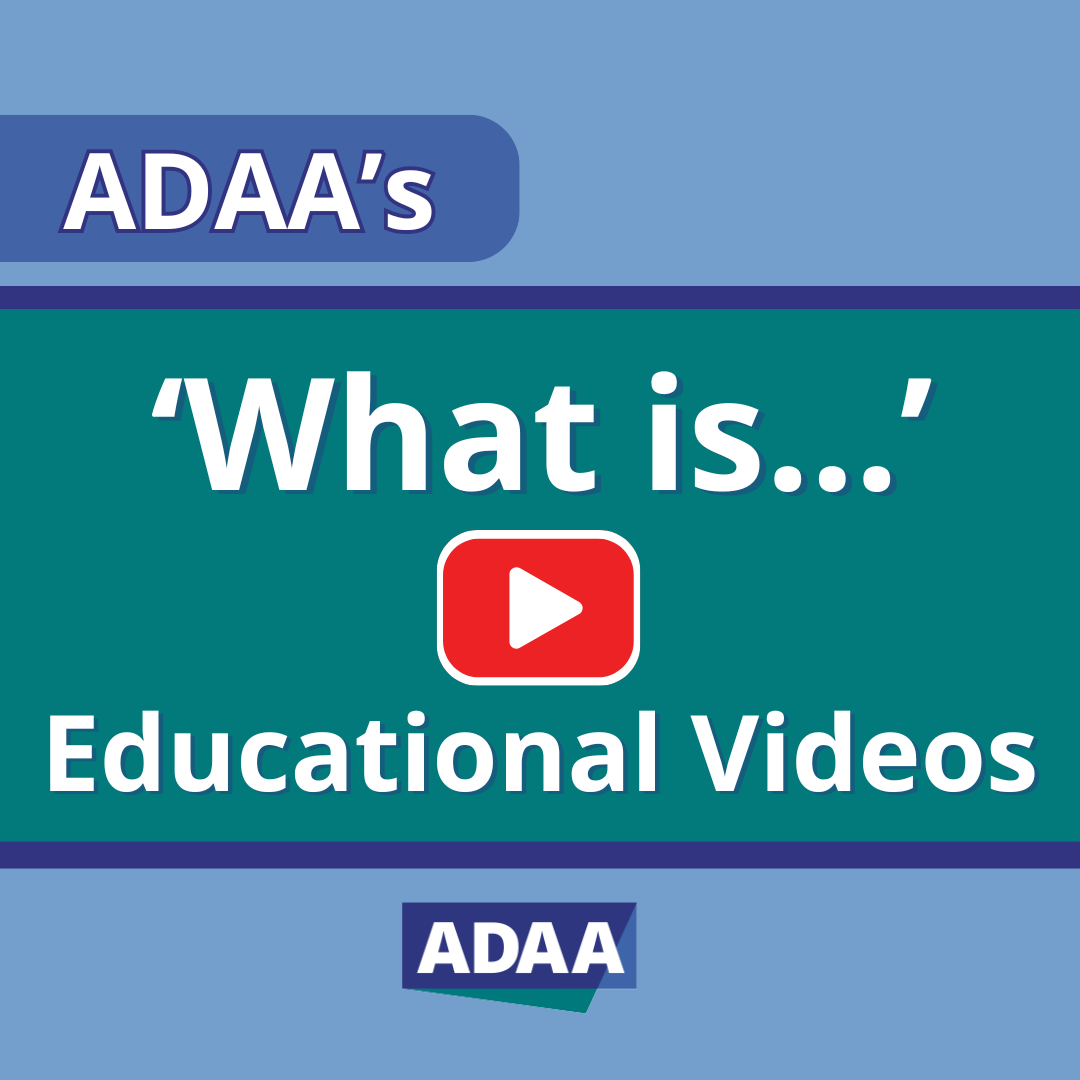Search Results for: ...
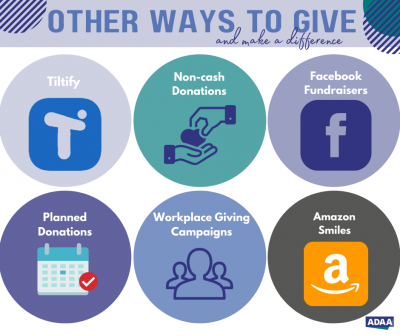
Planned Giving + −
Foundation Contributions
ADAA is a 501(c)(3) and can accept contributions from family, corporate, and private foundations. Contact Susan Gurley, ADAA Executive Director, for more information.
ADAA is a 501(c)3 organization. As no goods or services are provided in return for any charitable contributions, the entire amount of your donation is tax deductible in accordance with IRS regulations. ADAA's Tax ID#: 52-1248820.
Please note that ADAA offers an EFT option with many trusts and funds.
If you have any questions about donating online, please send us an e-mail or call 240-485-1016. To send your gift by U.S. Mail, please make your check payable to ADAA and mail it to ADAA, 8701 Georgia Avenue, Suite 412, Silver Spring, MD 20910. Thank you!
Donor Advised Fund (DAF) + −
A Donor Advised Fund, or DAF, is an organized and easy way for donors to make charitable gifts. A DAF has the potential to help ADAA as we focus on research and treatments for anxiety disorders and depression.
During your lifetime you can recommend a grant from your Donor Advised Fund to impact the lives of those struggling with these disorders. Think of it as your personal charitable checkbook.
3 Easy Ways Steps
- Open your DAF with a financial institution like Fidelity or Schwab
- Contribute to the DAF and get an immediate tax refund
- Recommend grants to your favorite organizations - like ADAA
You can make a gift at any time and receive an immediate tax benefit. Your gift is invested and grows tax-free. ADAA offers an EFT option with many DAFs and trusts.
Interested in learning more? Please contact [email protected]
Non-Cash Ways to Donate + −
You can donate more than just cash. Donating cash is always easy, whether by check, bank wire or Electronic Funds Transfer. And when you donate cash, you can generally deduct up to 50% of your adjusted gross income. But cash isn't the only thing you can use to support ADAA. You can also donate a variety of other assets, including:
- Mutual fund shares
- Publicly traded stocks, including long-term appreciated securities
- Wills and Living Trusts – secure a charitable estate-tax deduction for the value of the gift, and know that your generosity will support our mission for years to come.
- Retirement Plans – your retirement-plan benefits are likely a significant portion of your net worth, and because of special tax considerations, they could make an excellent choice for funding a charitable gift.
- Life insurance policies - life insurance itself can be the direct funding medium for a gift, permitting the donor to make a substantial gift (face value of policy) for a relatively modest annual outlay (i.e., the premium payment).
- Publicly traded bonds
- Appreciated Securities – gifts of long-term appreciated property can generate the most favorable tax benefits: a charitable deduction (in most cases) for the full fair-market value of the property plus avoidance of any potential capital-gain tax.
- Non-publicly traded assets, including private or restricted company stock and real estate
To speak to ADAA about non-cash ways to give please call 240-485-1016 or email [email protected]
Facebook Fundraisers + −

Start your own Facebook Fundraiser here today
Memorials and Dedications
Honor a loved one by donating in their memory or honor. Help build onto their legacy by offering a gift in their name.
Tiltify + −
If you love gaming, then rally your friends together virtually or in-person, or play by yourself, for a cause. Tiltify allows people in the gaming world to “play for fund” – your friends and family can donate to support our mission.
Wedding Registry + −
Make the most of your celebration by dedicating your special day to support ADAA's mission. Add ADAA to your wedding registry as a wonderful gift option for your friends and family to celebrate your special day. You can provide this donate online option or create your own personal fundraiser. Have a question? Email [email protected]
Workplace Giving Campaigns + −
Employer matching gifts is a great way to add value to what your employees do. Virtual or together, you and your employees can create a meaningful fundraiser. Select ADAA to receive matching gifts from your employer, the United Way, America's Best Charities, or the Combined Federal Campaign (CFC); ADAA charity code: 11220. ADAA's tax ID number is 52-1248820
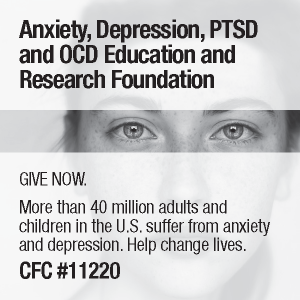
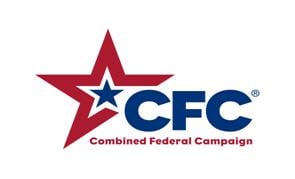


For more information about donation options, please email [email protected] or call 240-485-1016 (please note that you will need to leave a voicemail message).
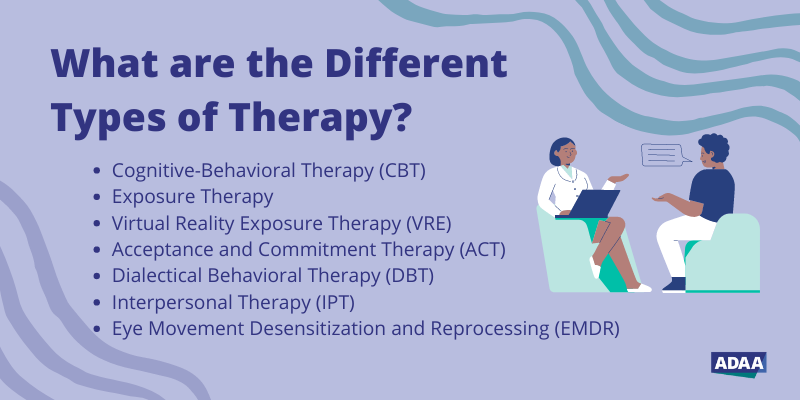
Anxiety disorders and depression are treatable. Many people experience meaningful symptom relief and improvement in their quality of life with professional care. However, treatment success varies. Some people respond to treatment after a few weeks or months while others may take longer. If people have more than one anxiety disorder or if they suffer from other co-existing conditions, treatment may take longer. An experienced provider will conduct a comprehensive assessment before discussing an individualized treatment plan. Download our Therapy Options Guide infographic.
To learn more in-depth about different types of therapy and treatments, check out ADAA's Patient Guide to Mood and Anxiety Disorders.
Types of Therapy
Cognitive-Behavioral Therapy (CBT) + −
A well-established, highly effective, and lasting treatment is called cognitive-behavioral therapy, or CBT. It focuses on identifying, understanding, and changing thinking and behavior patterns. Benefits are usually seen in 12 to 16 weeks, depending on the individual.
In this type of therapy the patient is actively involved in his or her own recovery, has a sense of control, and learns skills that are useful throughout life. CBT typically involves reading about the problem, keeping records between appointments, and completing homework assignments in which the treatment procedures are practiced. Patients learn skills during therapy sessions, but they must practice repeatedly to see improvement.
- Watch ADAA's Video on CBT.
- Download our What is CBT? infographic.
- The Wisdom of Cognitve Behavioral Therapy (CBT): The Perfect Gift for New Moms
Check out four helpful evidence- based videos produced by the Washington University Pediatric & Adolescent Ambulatory Research Consortium, Washington University Medical School. The videos feature ADAA member Melanie Van Dyke, PhD. The videos cover: Evidence-based Therapy for Adolescent Depression, Cognitive Behavioral Therapy, Selecting a CBT Therapist and How to Know if Therapy is Working.
To learn more in-depth about Cognitive-Behavioral Therapy and other treatments, check out ADAA's Patient Guide to Mood and Anxiety Disorders.
ADAA blogs:
Exposure Therapy + −
A form of CBT, exposure therapy is a process for reducing fear and anxiety responses. In therapy, a person is gradually exposed to a feared situation or object, learning to become less sensitive over time. This type of therapy has been found to be particularly effective for obsessive-compulsive disorder and phobias.
Virtual Reality Exposure Therapy (VRE)*
VRE is a type of exposure therapy that uses virtual reality (i.e., interactive computer-generated simulations) to present the patient with stimuli for exposure therapy with a therapist. Exposure therapy helps people confront what they fear in a therapeutic manner so that the fear decreases. VRE has the advantage of being able to present situations that may be difficult to arrange in real life, for example, flying on an airplane for someone with the fear of flying. The therapist can exactly control the VRE stimuli to create the perfect exposure for that patient, for example, making sure there is no turbulence until the patient is ready for turbulence. Research supports VRE for PTSD, social anxiety, and specific phobias (e.g., fear of heights and flying).
The virtual reality system is just a tool used within VRE – it is not the therapy. Patients interested in VRE should not be directed toward equipment but rather clinicians trained in VRE and explore how VRE might provide additional benefits over conventional exposure therapy.
Q. What questions should a patient ask his/her doctor or clinician about what virtual reality tool might help their disorder?
- What is my diagnosis? What is the evidence for virtual reality exposure therapy for this problem? What is your experience using virtual reality exposure therapy for this problem?
Q. How do I know the tool is working for me?
- If your provider is practicing evidence-based care, they will assess your symptoms and progress using questionnaires or other evaluations throughout treatment. Hopefully, you will notice improvement, usually in experiencing less anxiety and less avoidance.
To learn more in-depth about Exposure Therapy and other treatments, check out ADAA's Patient Guide to Mood and Anxiety Disorders.
Trending Article:
- How virtual reality can help address the mental health professional shortage, Go Science, Risa Weisberg, PhD
#VRE content authored by Barbara O. Rothbaum, PhD, ABPP and Andrew Sherill, PhD
Acceptance and Commitment Therapy (ACT) + −
Also known as ACT, this type of therapy uses strategies of acceptance and mindfulness (living in the moment and experiencing things without judgment), along with commitment and behavior change, as a way to cope with unwanted thoughts, feelings, and sensations. ACT imparts skills to accept these experiences, place them in a different context, develop greater clarity about personal values, and commit to needed behavior change.
To learn more in-depth about Acceptance and Commitment Therapy and other treatments, check out ADAA's Patient Guide to Mood and Anxiety Disorders.
Dialectical Behavioral Therapy (DBT) + −
Integrating cognitive-behavioral techniques with concepts from Eastern meditation, dialectical behavioral therapy, or DBT, combines acceptance and change. DBT involves individual and group therapy to learn mindfulness, as well as skills for interpersonal effectiveness, tolerating distress, and regulating emotions.
To learn more in-depth about Dialectical Behavioral Therapy and other treatments, check out ADAA's Patient Guide to Mood and Anxiety Disorders.
Interpersonal Therapy (IPT) + −
Often referred to as IPT, interpersonal therapy is a short-term supportive psychotherapy that addresses interpersonal issues in depression in adults, adolescents, and older adults. IPT usually involves 12 to 16 one-hour weekly sessions. The initial sessions are devoted to gathering information about the nature of a person’s depression and interpersonal experience.
Eye Movement Desensitization and Reprocessing (EMDR)
EMDR is a type of therapy that can help you heal from past life events that impact you in the present. Utilizing bilateral stimulation, through eye movements, tapping, and/or tones, EMDR taps into a natural healing process in our brain that helps to “unlock” distressing memories. In doing so, it reduces the overall emotional and physical distress connected to a memory and shifts a negative belief to an adaptive belief. Research supports the effectiveness of EMDR as a therapy to target past traumatic and distressing experiences.
- Check out this article: Considering EMDR Therapy? What to Expect.
- Read more about EMDR from the National Center for PTSD
To learn more in-depth about Interpersonal Therapy and other treatments, check out ADAA's Patient Guide to Mood and Anxiety Disorders.
Treatments Under Study + −
Inference-based Cognitive Behavioral Therapy (I-CBT)
I-CBT was created by Dr. Stephen P. Shuchter in the 1980s, primarily for the treatment of Obsessive Compulsive Disorder (OCD). I-CBT is a treatment based on the central idea that obsessions are abnormal doubts about what “could be”, or “might be” (e.g. “I might have left the stove on”; “I might be contaminated”; “I might be a deviant”).
I-CBT’s approach emphasizes identifying core beliefs and underlying assumptions that are associated with OCD and reframing them in a more positive manner to facilitate recovery. Learn more.
ADAA Blog:
Transcranial Magnetic Stimulation (TMS) + −
Transcranial magnetic stimulation, known as TMS or rTMS, may be a safe, effective, and noninvasive option for people who have depression that has not improved with medications. TMS creates a magnetic field to induce a small electric current in a specific part of the brain; the current comes from the magnetic field created by an electromagnetic coil that delivers pulses through the scalp. TMS is an FDA-approved treatment and recently (June 2019), the Brainsway Deep TMS device was approved for the treatment of OCD. There is ongoing research on the use of TMS to treat PTSD and other mental health conditions.
TMS does not require sedation, is non-invasive and is virtually pain-free. With modern safety techniques, there is a less than 0.1% risk of seizure or loss of consciousness with TMS. Those receiving TMS usually are treated four or five times every week for four to six weeks. Research shows that TMS produces few side effects. Each treatment session lasts about 40 minutes. A new form of TMS called theta burst stimulation was recently approved by the FDA for the treatment of depression; sessions of theta burst stimulation last only about 10 minutes but still are provided daily for several weeks.
To find out if TMS is the right treatment for you, speak to your therapist, doctor, or other mental health treatment provider. Your insurance may provide reimbursement for this treatment.
To learn more in-depth about Transcranial Magnetic Stimulation and other treatments, check out ADAA's Patient Guide to Mood and Anxiety Disorders.
Learn more about the different types of TMS here.
ADAA Resources + −
- How to Navigate the Transition to a New Therapist - blog
- “Is This All My Fault?” Addressing the Myth that CBT Blames People for Their Problems - blog
- Dispelling the Stigma Surrounding Psychotherapy - blog
- Find Your Therapist Directory - Search the directory of licensed ADAA mental health providers members who specialize in anxiety disorders, depression, OCD, PTSD, and related disorders.
- 5 Tips to Learn if an Anxiety Therapist is the Right Fit for You - blog page
- Learn about different types of mental health care professionals Website page
- Residential Treatment for Youth with OCD: Answers to Your Top 3 Questions, Webinar
- Can CBT Help with Neurological Disorders? Webinar
- Overcoming Social Anxiety: Cognitive Behavior Therapy (CBT) to Build Self-Confidence and Lessen Self-Consciousness Webinar
- Cognitive Behavioral Therapy (CBT) for Tinnitus Distress Webinar
- Helping Kids and Teens Who Have OCD Webinar
- Taking the Terror Out of Terrorism: How CBT Can Relieve Your Anxiety Webinar
- What Is Cognitive-Behavioral Therapy and How Is It Used to Treat Anxiety and Depression? Webinar
- So You've Decided to Start Therapy for Your Anxiety: Here's How to Make it Work Blog
- Important Questions for Your Therapist and Insurance Carrier Infographic
Medication treatment of anxiety and depression is generally safe and effective and is often used in conjunction with therapy. Medication may be a short-term or long-term treatment option, depending on severity of symptoms, other medical conditions, and other individual circumstances. However, it often takes time and patience to find the drug that works best for you.
To learn more in-depth about different medications and treatments, check out ADAA's Patient Guide to Mood and Anxiety Disorders.
Medications are commonly prescribed by physicians (family practice, pediatricians, OB-GYNs, psychiatrists), as well as nurse practitioners in many states.
There are four major classes of medications that are used in the treatment of anxiety disorders:
Discussing Medications: What You Need to Know + −
Use these guidelines to talk to your health care professional about medications:
- To avoid potentially dangerous drug interactions, let your mental health care provider know all medications you are taking, including prescriptions and over-the-counter drugs, herbal or dietary supplements, and vitamins. And make sure your family doctor knows you are taking medications for an anxiety disorder.
- Learn when to take a new medication and how, such as on any empty stomach or with food, in the morning or evening, and how frequently.
- Find out how long it should take for the medication to start working and what you should expect when this happens.
- Ask: How will the medication help me? What side effects might occur? Should I avoid any foods or beverages? Are drug interactions with other prescriptions a possibility? How often you should see the doctor for a medication check-up?
- Ask for the prescribing physician’s after-hours phone number in case you develop side effects.
- A good source of information about medications and over-the-counter products is your pharmacist, who should have information about all your prescriptions to advise you about possible drug interactions, side effects, and instructions for use.
If your physician does not want to spend the time to answer your questions, you may need a referral to a different physician.
Selective Serotonin Reuptake Inhibitors (SSRIs) + −
SSRIs relieve symptoms by blocking the reabsorption, or reuptake, of serotonin by certain nerve cells in the brain. This leaves more serotonin available, which improves mood. SSRIs (citalopram, escitalopram, fluoxetine, paroxetine, and sertraline) generally produced fewer side effects when compared with tricyclic antidepressants. However, common side effects include insomnia or sleepiness, sexual dysfunction, and weight gain. They are considered an effective treatment for all anxiety disorders, although the treatment of obsessive-compulsive disorder, or OCD, typically requires higher doses. Read this blog about SSRIs and Benzodiazepines.
To learn more in-depth about Selective Serotonin Reuptake Inhibitors (SSRIs), check out ADAA's Patient Guide to Mood and Anxiety Disorders.
Serotonin-Norepinephrine Reuptake Inhibitors (SNRIs) + −
The serotonin-norepinephrine reuptake inhibitor, or SNRI, class (venlafaxine and duloxetine) is notable for a dual mechanism of action: increasing the levels of the neurotransmitters serotonin and norepinephrine by inhibiting their reabsorption into cells in the brain. As with other medications, side effects may occur, including stomach upset, insomnia, headache, sexual dysfunction, weight gain and minor increase in blood pressure. These medications are considered as effective as SSRIs, so they are also considered a first-line treatment for the treatment of anxiety disorders, but not for obsessive compulsive disorder, where SSRI’s are the preferred first line treatment.
To learn more in-depth about Selective Serotonin-Norepinephrine Reuptake Inhibitors (SNRIs), check out ADAA's Patient Guide to Mood and Anxiety Disorders.
Benzodiazepines + −
This class of drugs is frequently used for short-term management of anxiety and as an add on treatment, in treatment resistant anxiety disorders. They are not recommended as a treatment for Post Traumatic Stress Disorder. Benzodiazepines (alprazolam, clonazepam, diazepam, and lorazepam) are highly effective in promoting relaxation and reducing muscular tension and other physical symptoms of anxiety. Long-term use may require increased doses to achieve the same effect, which may lead to problems related to tolerance and dependence. Read this blog post about SSRIs and Benzodiazepines.
To learn more in-depth about Benzodiazepines, check out ADAA's Patient Guide to Mood and Anxiety Disorders.
Tricyclic Antidepressants + −
Concerns about long-term use of the benzodiazepines led many doctors to favor tricyclic antidepressants (amitriptyline, imipramine, and nortriptyline). Although effective in the treatment of some anxiety disorders(but not Social Anxiety Disorder), they can cause significant side effects, including orthostatic hypotension (drop in blood pressure on standing), constipation, urinary retention, dry mouth, and blurry vision.
Contact your physician if you experience side effects, even if you are not sure a symptom is caused by a medication. Do not stop taking a medication without consulting with the prescribing physician; abrupt discontinuation may cause other health risks.
Medications will work only if they are taken according the explicit instructions of your physician, but they may not resolve all symptoms of an anxiety disorder. Learn more about how antidepressants work.
To learn more in-depth about Tricyclic Antidepressants, check out ADAA's Patient Guide to Mood and Anxiety Disorders.
Questions to Ask About a New Drug/Treatment on the Market: + −
- Is this new drug/treatment appropriate for me?
- What are the drawbacks, if any of this new treatment?
- What might be the benefits over my current regimen?
- Is the price (typically high when a drug is new) worth the added benefit?
- Is this treatment ready for widespread use? Meaning, does it have safety established? Do we know how long people need to be on this treatment? Do we know about any long term issues that could result from this?
Emerging Medications + −
Ketamine (Esketamine)
Ketamine represents a major step forward in the treatment of depression and suicide prevention. Read ADAA's Public Statement regarding FDA approved nasal spray medication - Spravato (esketamine) for treatment-resistant depression, available only at a certified doctor’s office or clinic.
To learn more in-depth about Ketamine (Esketamine), check out ADAA's Patient Guide to Mood and Anxiety Disorders.
- Ketamine: A Rising Star in Mental Health Treatment, ADAA blog post
- Infographic, Ketamine Fact Sheet
- Researchers discover positive effects of intravenous ketamine for treatment-resistant depression, Baylor College of Medicine, Sanjay Mathews, MD
Additional Research Studies About Ketamine and Psychedlics: Posted April 2021
AMJ Psychiatry 2020 Issue: Synthesizing the Evidence for Ketamine and Esketamine in Treatment-Resistant Depression: An International Expert Opinion on the Available Evidence and Implementation, Roger S. McIntyre, M.D., Joshua D. Rosenblat, M.D., M.Sc., (ADAA President Elect and CMO) Charles B. Nemeroff, M.D., Ph.D., Gerard Sanacora, M.D., Ph.D., (ADAA member) James W. Murrough, M.D., Ph.D., Michael Berk, Ph.D., M.B.B.Ch., Elisa Brietzke, M.D., Ph.D., Seetal Dodd, Ph.D.,Philip Gorwood, M.D., Ph.D., Roger Ho, M.D., M.B.B.S., Dan V. Iosifescu, M.D., Carlos Lopez Jaramillo, M.D., Ph.D., Siegfried Kasper, M.D., Kevin Kratiuk, B.Pharm., Jung Goo Lee, M.D., Ph.D., Yena Lee, H.B.Sc., Leanna M.W. Lui, Rodrigo B. Mansur, M.D., Ph.D., George I. Papakostas, M.D., Mehala Subramaniapillai, M.Sc., (ADAA member) Michael Thase, M.D., Eduard Vieta, M.D., Ph.D., Allan H. Young, M.Phil., M.B.Ch.B., Carlos A. Zarate, Jr., M.D., Stephen Stahl, M.D., Ph.D.
In this article, an international group of mood disorder experts provides a synthesis of the literature with respect to the efficacy, safety, and tolerability of ketamine and esketamine in adults with treatment-resistant depression. The authors also provide guidance for the implementation of these agents in clinical practice, with particular attention to practice parameters at point of care. Areas of consensus and future research vistas are discussed.
AMJ Psychiatry 2020 Issue: Psychedelics and Psychedelic-Assisted Psychotherapy. Collin M. Reiff, M.D., Elon E. Richman, M.D., (ADAA President Elect and CMO) Charles B. Nemeroff, M.D., Ph.D., Linda L. Carpenter, M.D., Alik S. Widge, M.D., Ph.D., Carolyn I. Rodriguez, M.D., Ph.D., (ADAA member) Ned H. Kalin, M.D., William M. McDonald, M.D., and the Work Group on Biomarkers and Novel Treatments, a Division of the American Psychiatric Association Council of Research
- Objective: The authors provide an evidenced-based summary of the literature on the clinical application of psychedelic drugs in psychiatric disorders.
- Results: The most significant database exists for MDMA and psilocybin, which have been designated by the U.S. Food and Drug Administration (FDA) as “breakthrough therapies” for posttraumatic stress disorder (PTSD) and treatment-resistant depression, respectively. The research on LSD and ayahuascais observational, but available evidence suggests that these agents may have therapeutic effects in specific psychiatric disorders.
- Conclusions: Randomized clinical trials support the efficacy of MDMA in the treatment of PTSD and psilocybin in the treatment of depression and cancer-related anxiety. The research to support the use of LSD and ayahuasca in the treatment of psychiatric disorders is preliminary, although promising. Overall, the database is insufficient for FDA approval of any psychedelic compound for routine clinical use in psychiatric disorders at this time, but continued research on the efficacy of psychedelics for the treatment of psychiatric disorders is warranted.
A Consensus Statement on the Use of Ketamine in the Treatment of Mood Disorders, JAMA Psychiatary, April 2017, Gerard Sanacora, MD, PhD; Mark A. Frye, MD; William McDonald, MD; ADAA Board Member Sanjay J. Mathew, MD; Mason S. Turner, MD; ADAA member Alan F. Schatzberg, MD; Paul Summergrad, MD; ADAA Board Member and Chief Medical Officer Charles B. Nemeroff,MD, PhD; for the American Psychiatric Association (APA) Council of Research Task Force on Novel Biomarkers and Treatments
Efficacy and Safety of Intranasal Esketamine for the Rapid Reduction of Symptoms of Depression and Suicidality in Patients at Imminent Risk for Suicide: Results of a Double-Blind, Randomized, Placebo-Controlled Study, American Journal, 2018
Double-blind, placebo-controlled, dose-ranging trial of intravenous ketamine as adjunctive therapy in treatment-resistant depression (TRD), Molecular Psychiatry, September 2018
What to Know About Ketamine Therapy for Depression, Healthline, 2022
Medical Marijuana/Cannabis/CBD
- Can CBD Help with My Anxiety and Depression? ADAA blog post
- Medical Cannabis: Cause for Pause or Avenue to Alleviation? ADAA blog post
Psychedelics
Several psychedelic medicines including psilocybin and MDMA are undergoing FDA-regulated clinical trials for treatment-resistant depression, PTSD, and related conditions. However, as of late 2022, none have received U.S. regulatory approval and they remain classified as DEA Schedule 1 drugs.
As this is a rapidly evolving area, ADAA is committed to providing timely updates on this topic as new data emerges. Learn more:
- Psychedelic Therapy: Promises and Problems, ADAA Professional Webinar (Recorded live October 27,2022)
- Single-Dose Psilocybin for a Treatment-Resistant Episode - New England Journal if Medicine, November 3, 2022
- How MDMA Resensitizes the Brain, Nature, September 28, 2022
- MDMA-assisted therapy for severe PTSD: a randomized, double-blind, placebo-controlled phase 3 study, Nature Medicine, October 2021
- Hallucinogens in Mental Health: Preclinical and Clinical Studies on LSD, Psilocybin, MDMA, and Ketamine, The Journal of Neuroscience, February 3, 2021
ADAA Medication Information Resources + −
- Medication for Treatment of OCD: Understanding the Options, ADAA blog post
- SSRIs and Benzodiazepines for General Anxiety Disorders (GAD), ADAA blog post
- Anxiety Medication Guide for Parents, AACAP.org, written by ADAA member John Walkup, MD
- Can CBD Help with My Anxiety and Depression? - ADAA web page
- The Meaning of Medications - Another Look at Compliance - Revisited - ADAA blog post
- A Most Difficult Decision - Medication and Pregnancy - ADAA blog post
- Psychotropic Medications: What You Should Ask Your Doctor - ADAA blog post
- For My Anxiety or Depression: Should I Use Medication or Therapy - ADAA webinar
- Medication for Anxiety: Benefits and Side Effects - ADAA webinar
- Depression: What You Need to Know About Medications - ADAA webinar
- Depression - ADAA Brochure
Important Resources and Patient Assistance Programs + −
Most pharmaceutical companies offer patient-assistance programs for uninsured patients. These programs provide prescribed medication at little to no cost. Eligibility varies; see the Partnership for Prescription Assistance website for more information, or contact companies directly about their patient assistance programs.
- A New Patient Assistance Program Offering from Janssen. For Insured Patients Who Are Facing Access and Affordability Challenges. A Quick Reference Guide
- Community Assistance Program (CAP) provides free downloadable prescription cards accepted at over 56,000 pharmacies. Cardholders receive the lowest price available for any particular drug at their chosen pharmacy.
- NeedyMeds is a 501(c)(3) national non-profit information resource dedicated to helping people locate assistance programs to help them afford their medications and other healthcare costs.
Alliance for Safe Online Pharmacies
The Alliance for Safe Online Pharmacies (ASOP Global), a 501(c)(4) non-profit organization is dedicated to protecting consumers around the world, ensuring safe access to medications, and combating illegal online drug sellers.
Membership Benefits
Events + −
Present at and Attend the Annual Conference−
ADAA convenes an annual conference usually in March or April that brings together clinicians, social workers, psychiatrists, researchers, and other experts who want to improve treatments and find cures for anxiety, depression, and co-occurring disorders. As a member you receive a members-only significantly discounted registration rate and complimentary CE’s (usually 18+ credits per conference).
- Present your latest research/clinical expertise in a session at the conference or volunteer to peer-review your colleagues’ submissions.
- Present a poster
- For early career professionals and students, take advantage of the career development opportunities and apply to the ADAA Awards programs.
Career Development + −
Complimentary Continuing Education Credits−
ADAA’s peer-to-peer continuing education programs support patient care and accelerate the dissemination of research into practice by promoting the implementation of evidence-based treatments and best practices. ADAA hosts numerous live and on-demand interdisciplinary continuing education and professional development webinars annually. As a member you receive complimentary CE/CME credits and free registration to live webinars and access to all on-demand webinars. ADAA also partners with the Ross Center to offer ADAA members free access to their library of live and on-demand webinars.
Explore ADAA's upcoming live and on-demand webinar library.
Find Your Therapist (FYT) Directory Listing−
Expand your reach and list your practice on ADAA's Find Your Therapist platform. ADAA's website receives over 5 million unique website visitors each year. Learn how to manage your directory profile here.
Host a Webinar or Write a Blog Post
Share your treatment expertise or current research with our public or professional audience. Reach 5.5 million annual unique website visitors and tens of thousands of newsletter subscribers and social media followers.
Mental Health Career Center - Search, Find, Apply, and Post Jobs−
Post job openings for free and search for career opportunities on ADAA’s Mental Health Career Center.
Professional Involvement + −
Join Special Interest Groups and Committees
Join a Committee or one of ADAA's nine Special Interest Groups and participate in monthly peer-consultation calls.
Special Interest Groups (SIGs) are a vibrant forum for ADAA members with a common interest to participate in education, research, mentoring, and networking. SIGs help support ADAA’s commitment to diversity, inclusion, and equity within the mental health field.
Network in our Member-Online Forum
Network and collaborate with peers, share strategic advice, solve challenges, and develop new approaches through ADAA’s Member-only Online Forum.
Share Your Books & Publications, and Media Placements−
- Promote your self-help or research books and publications by listing it at no cost on ADAA's Bookstore & Reading List webpage and find new audiences through ADAA’s public and professional communities.
- ADAA shares your book through our social media channels and through ADAA's public newsletter Triumph and professional newsletter Insights.
- Submit your information here with your book/publication title and purchase link, and a two-sentence description.
- Share your media placements on ADAA's Members in the News website page and enhance your reach.
Submit to the ADAA Journal of Mood & Anxiety Disorders−
Journal of Mood & Anxiety Disorders™, the official Journal of ADAA, welcomes original clinical, translational, and basic research as well as synthetic review articles covering neurobiology (genetics and neuroimaging), epidemiology, experimental psychopathology, pathophysiology and treatment (psychotherapeutic, neuromodulation, and pharmacologic) aspects of mood and anxiety disorders. We encourage original research submissions from basic neuroscientists and pharmacologists as well as all clinical investigators to establish a platform for translational advances and discussion. To advance this discussion, review papers focusing on current treatment advances as well as those providing innovative and cutting-edge reviews of key areas and issues guiding mood and anxiety disorder science will be prioritized. We encourage submissions from international experts. All submissions are peer reviewed.
Submit to the Journal of Mood & Anxiety Disorders™
Share Research Updates and Clinical Trials
Share your research news and clinical trials.
Apply for Awards and Mentorship Opportunities−
ADAA Awards Program recognizes ADAA members, students, and early career professionals. Learn more about the ADAA awards programs including:
- Donald F. Klein Early Career Investigator Award
- Alies Muskin Career Development Leadership (CDLP) Program
- BIPOC Membership Scholarship Program
- And more.
Partner Benefits + −
ADAA partners with The Ross Center in collaboration with ARC Health, to provide ADAA members access to live and on-demand continuing education opportunities. The partnership enhances ADAA’s current professional webinar programming and offers ADAA members access to The Ross Center’s CE education library at no charge. Ross Center educational trainings and workshops include live, interactive webinar presentations as well as video on-demand home study courses on topics such as cultural competence, LGBTQIA+, ethics, law, and risk management. To learn more and register click here.
ADAA partners with Postpartum Support International (PSI). ADAA members receive 25% off PSI Membership - contact us at [email protected] for the discount code. We are proud to have a community of strong partnerships and supporters. Click here to learn more.
We are proud to have a community of strong partnerships and supporters. Click here to learn more.
Become a Member of ADAA
Up to 35 free CE/CME credits per year
ADAA is a premier professional organization uniting global experts in anxiety, depression, OCD, PTSD, bipolar and related disorders. Our diverse multidisciplinary membership includes clinicians, researchers, and professionals from various disciplines, offering valuable education, networking, and career advancement opportunities. Discover membership benefits to propel your career forward.
Testimonials
What Current Members Have to Say About ADAATestimonials
Have an ADAA membership inquiry? Please email [email protected] or call 240-485-1018.




